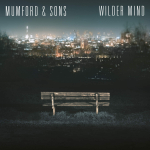
Mumford & Sons Wilder Mind
(Island / Glassnote)
Marcus Mumford went to New Jersey once. The Sons had been booked for three nights at the Barclays Center — all sold-out shows. The gear is packed up and the band is settled in and ready to speed through the tri-state in a big rustic bullet, the interior of which is done up like a hushed cabin out in the country — wooden floors, oak framed windows, creaky plank door that doesn’t quite lock for the indoor outhouse, the works. All along the way, he points at every landmark and insists with utter conviction that that had been where Bruce Springsteen was born. He plays his first-pressing copy of Born To Run repeatedly on an antique Woodland gramophone and asserts that he feels some sort of kinship with the landscape. “I want to make an album like that, but with more sincerity — depth, ya know? More whispery moments and stillness”, he says in his earnest, mumbled Briton accent, “That would be fantastic. Springsteen has never made a bad album, ya know?” His manager nods, Carey smiles and looks back out at the shifting tundra of parkway and turnpike, the banjo player begins to sweat, and the record skips and starts all over again. He then suddenly pulls out a map of New Jersey and gently lays his finger down. “We’re doing a festival here, right here — Seaside.” His manager dials a number and quickly makes it happen.
The next morning, Mumford wakes up in Brooklyn and fields a phone call from a reporter about the festival. “We love it here in New Jersey. I’m currently overlooking one of its most beautiful cities and I just find it lovely”, he whispers into the receiver. “Yes, but why Seaside?”, the other line retorts. "We deliberately look for towns that have something unique, or some vibe of which they are proud, explore them and enjoy what they have to offer," Mumford says reading off a press statement just given to him by a handler, “Plus, it’s where Springsteen was born.” The following afternoon, Mumford is in the studio. He is holding a Fender Jazz Master and unconsciously striking various poses — the electric guitar hugs the curve of his gut in a much more comfortable way than his old acoustic. “It’ll be like when Dylan went electric, ya know? I don’t anticipate the fans will be on-board at first, but that’s what happens when you subvert expectations, right? We always have to remain fresh”, Marcus says, thinking aloud to producer James Ford. Ford mics the session booths the same way he has done for every other Arctic Monkey’s record — after all, that’s what he is being paid to do. Management comes in and inspects the studio, they run down a brief checklist before finally green-lighting the production.
The band begins to slog through the session — each song sounds like the sonic embodiment of utter indifference, only this time it’s accompanied by electric instruments. Winston Marshall peers through the glass of Session Booth A where Ben Lovett is recording keyboards, still eagerly awaiting his turn to be called in for overdubs. The echoey, dramatic sounds of Believe bleed through into the control room. The song sounds different from other ‘classic’ Mumford songs, but surely there must still be room for some barn-stomping? Perhaps somewhere in the bridge when the pace lifts up? Slowly, the sound from Session Booth B begins to cut in — it’s the crass sound of electric rhythms being recorded for Wolf. Marshall pretends not to hear it and continues to stare at the two-inch plate glass for three full hours, periodically breaking eye contact to check up on his closed banjo case, but he’s never tapped for recording. The session ends on a bit of a down note when attempts to overdub the slight chime of acoustic guitar onto the intro of Snake Eyes fails. The group settles for clean electric guitar instead and call it a day, leaving the rest of the arrangements to Aaron Dessner, who is still trying to make the electro-violin orchestration at the end of Broad-Shouldered Beasts work and hasn’t been able to sleep for six days.
The following night, Mumford returns to the studio reinvigorated and ready to face the final days of recording. “Aaron, I’ve just been to the most amazing place!”, he raves in his own quiet, humble Englishman way. “Tomkins Square Park! Oh what a place for lovers! Gloomy, but beautiful. Ya know, I really feel like I’m just now understanding where Springsteen gets all of his star-crossed inspiration”, he adds. Dessner nods, turns around, and gets back into the soundproof console room, where he arbitrarily flips switches and barely utters a sentence to anyone else for the remainder of production. Winston Marshall is in the corner of the lounge area unpacking his gear. He hoists his Banjo over his shoulder and begins to tune. Mumford approaches him from behind, places his hand over his shoulder, and like a little league coach after a bad season, he lays it on him, “Not today, mate. I’m just not feeling it today.” Winston deflates and sinks into the lounge chair next to him. His eyes go dead and, like a former all-star high school quarterback, he stares into the empty session booth across the hall, replaying his wilder, barn-stomping glory days in his mind over and over again.
11 May, 2015 - 04:42 — Andrew Ciraulo